Items
In item set
Case Study 1
-
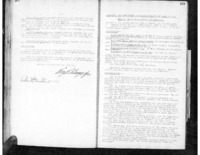 [Vancouver and New Westminster District Trade and Labor Council 1937-1938] Minute books of the Vancouver and New Westminster District Trades and Labor Council. Includes Regular, Executive, and Special Meetings.
[Vancouver and New Westminster District Trade and Labor Council 1937-1938] Minute books of the Vancouver and New Westminster District Trades and Labor Council. Includes Regular, Executive, and Special Meetings. -
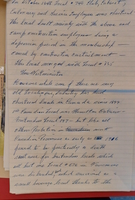 Scrapbook: merger Selected images taken of items from Fonds AM723, File 7. File contains records chronicling the amalgamation of Locals 28, 676 and 835 to form one union, Local 40.
Scrapbook: merger Selected images taken of items from Fonds AM723, File 7. File contains records chronicling the amalgamation of Locals 28, 676 and 835 to form one union, Local 40. -
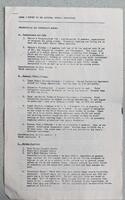 [SORWUC Local 1: Unit Reports NSC, Restaurants, Pubs 1977] Local 1 Unit Report to the National Special Convention. A. Restaurants and Pubs Bimini's and Church's Chicken. June 23/24 1977
[SORWUC Local 1: Unit Reports NSC, Restaurants, Pubs 1977] Local 1 Unit Report to the National Special Convention. A. Restaurants and Pubs Bimini's and Church's Chicken. June 23/24 1977 -
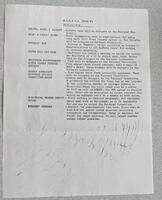 [SORWUC Local 1 Unit Reports:Victory at Biminis] Local 1 Unit Reports abt. Feb 1977. Meeting with Bimini's re 1st contract.
[SORWUC Local 1 Unit Reports:Victory at Biminis] Local 1 Unit Reports abt. Feb 1977. Meeting with Bimini's re 1st contract. -
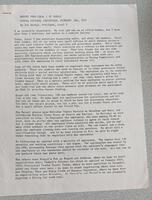 [Report SORWUC national Convention 1977] Report by Pat Barter, President, Local 1 of SORWUC for the National Convention held Feb 5, 1977. Includes an update on Biminis and Church's Chicken organizing.
[Report SORWUC national Convention 1977] Report by Pat Barter, President, Local 1 of SORWUC for the National Convention held Feb 5, 1977. Includes an update on Biminis and Church's Chicken organizing. -
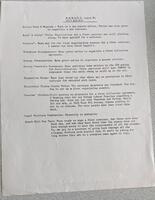 [SORWUC Local 1 Unit Reports] SORWUC Local 1Unit Reports [abt. Feb 1977]. Brief reports on the status of all actions, including that the first negotiation meeting with Bimini Neighbourhood Pub.
[SORWUC Local 1 Unit Reports] SORWUC Local 1Unit Reports [abt. Feb 1977]. Brief reports on the status of all actions, including that the first negotiation meeting with Bimini Neighbourhood Pub. -
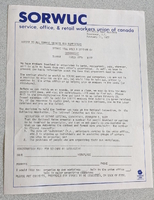 [Notice to SORWUC Members and Supporters: Organizing Seminar] Notice of an Organizing Seminar to be held March 27, 1977. These seminars were part of SORWUC's education programs aimed to train and encourage workers to initiate unions in their workplaces.
[Notice to SORWUC Members and Supporters: Organizing Seminar] Notice of an Organizing Seminar to be held March 27, 1977. These seminars were part of SORWUC's education programs aimed to train and encourage workers to initiate unions in their workplaces. -
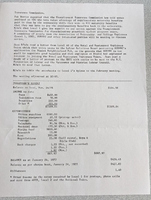 [Hotel and Restaurant Employees Union Loc 40 letter to SORWUC] Jean Rands reads a letter from Hotel and Restaurant Employees Union Local 40 written to the Labour Relations Board protesting SORWUC's application to represent Bimini Neighbourhood Pub.
[Hotel and Restaurant Employees Union Loc 40 letter to SORWUC] Jean Rands reads a letter from Hotel and Restaurant Employees Union Local 40 written to the Labour Relations Board protesting SORWUC's application to represent Bimini Neighbourhood Pub. -
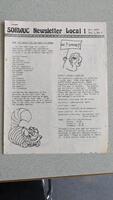 [SORWUC Newsletter Local 1 Oct. 1977 Vol.1, No. 2] The Negotiating Committee serves notice that a strike vote has been called after 8 months of negotiating with Bimini Neighbourhood Pub. Includes wage rates for servers.
[SORWUC Newsletter Local 1 Oct. 1977 Vol.1, No. 2] The Negotiating Committee serves notice that a strike vote has been called after 8 months of negotiating with Bimini Neighbourhood Pub. Includes wage rates for servers. -
 City Cancels 3 Cafe Licenses of Chinese (Sep, 16, 1937) The City cancels the licenses of three Vancouver Chinese cafes (Hong Kong Cafe, Gee Kong Cafe, and B.C. Royal Cafe) over dispute on the hiring of White waitresses to work in their cafes. Denis Murphy, (Murphy, Freeman and Murphy) is the cafes' counsel.
City Cancels 3 Cafe Licenses of Chinese (Sep, 16, 1937) The City cancels the licenses of three Vancouver Chinese cafes (Hong Kong Cafe, Gee Kong Cafe, and B.C. Royal Cafe) over dispute on the hiring of White waitresses to work in their cafes. Denis Murphy, (Murphy, Freeman and Murphy) is the cafes' counsel. -
 Jonnie Rankin Interview [Parts 2 and 3] In Part 2 of 3, Johnnie Rankin discusses the position of women within the Boilermakers Union and the types of jobs she worked at the shipyard. She also discusses childcare, equal pay, and the existence of issues specific to women. She talks about what she learned from the trade unions, and how working changed her life. Finally, she discusses working in restaurants and approaching the Hotel and Restaurant Employees Union. In Part 3 of 3, Johnnie Rankin discusses organizing in restaurants, going to business school, the 1946 strike and the role of women within it, the creation of the Labour Theatre Guild, and the political impact working during the war had on her.
Jonnie Rankin Interview [Parts 2 and 3] In Part 2 of 3, Johnnie Rankin discusses the position of women within the Boilermakers Union and the types of jobs she worked at the shipyard. She also discusses childcare, equal pay, and the existence of issues specific to women. She talks about what she learned from the trade unions, and how working changed her life. Finally, she discusses working in restaurants and approaching the Hotel and Restaurant Employees Union. In Part 3 of 3, Johnnie Rankin discusses organizing in restaurants, going to business school, the 1946 strike and the role of women within it, the creation of the Labour Theatre Guild, and the political impact working during the war had on her. -
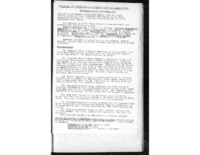 [CVA VDTLC 1944 Jul-Dec] Minutes of the Vancouver and New Westminster District Trades and Labor Council. Researcher scan of microfilm reel, part of City of Vancouver Archive Fonds AM307, Vancouver and District Trades and Labour Council fonds : 1889-1961.
[CVA VDTLC 1944 Jul-Dec] Minutes of the Vancouver and New Westminster District Trades and Labor Council. Researcher scan of microfilm reel, part of City of Vancouver Archive Fonds AM307, Vancouver and District Trades and Labour Council fonds : 1889-1961. -
 Daisy Brown Interview Daisy Brown was the office manager of the Hotel, and Restauarant Employees Union Local 28. She discusses her years with the Hotel and Restaurant Employees Union and building service union’s joint campaign to organize Vancouver hotels 1946-1947; the high number of single women parents and deserted wives working in the industry; the weakness of the union in comparison to industrial or skilled craft unions due to isolation of the workers; the difficulties the transient nature of the work and continuous shifts posed for organizers; issues of overtime, shift changes, uniforms, seniority; establishing the 40-hour work week; The Only Fish and Chips and Love’s Cafe, Vancouver; deposing the local HREU leadership in 1947 barring them from the office and membership in the union because of their left leanings.
Daisy Brown Interview Daisy Brown was the office manager of the Hotel, and Restauarant Employees Union Local 28. She discusses her years with the Hotel and Restaurant Employees Union and building service union’s joint campaign to organize Vancouver hotels 1946-1947; the high number of single women parents and deserted wives working in the industry; the weakness of the union in comparison to industrial or skilled craft unions due to isolation of the workers; the difficulties the transient nature of the work and continuous shifts posed for organizers; issues of overtime, shift changes, uniforms, seniority; establishing the 40-hour work week; The Only Fish and Chips and Love’s Cafe, Vancouver; deposing the local HREU leadership in 1947 barring them from the office and membership in the union because of their left leanings. -
 Elizabeth Wilson interview Audio and transcript of Sara Diamond's interview with Elizabeth Wilson.
Elizabeth Wilson interview Audio and transcript of Sara Diamond's interview with Elizabeth Wilson. -
 Chris Waddell interview Audio and transcript of Sara Diamond's interview with Chris Waddell.
Chris Waddell interview Audio and transcript of Sara Diamond's interview with Chris Waddell. -
 Pearl Moreau interview Audio and transcript of Sara Diamond's interview with Pearl Moreau.
Pearl Moreau interview Audio and transcript of Sara Diamond's interview with Pearl Moreau. -
 Sara McKinnon interview Audio and transcript of Sara Diamond's interview with Sara McKinnon.
Sara McKinnon interview Audio and transcript of Sara Diamond's interview with Sara McKinnon. -
 Josephine Hallock interview Audio and transcript of Sara Diamond's interview with Josephine Hallock.
Josephine Hallock interview Audio and transcript of Sara Diamond's interview with Josephine Hallock. -
 Thelma Godkin interview Audio and transcript of Sara Diamond's interview with Thelma Godkin.
Thelma Godkin interview Audio and transcript of Sara Diamond's interview with Thelma Godkin. -
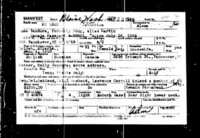 U.S., Border Crossings from Canada to U.S., 1895-1960 for Catherine McLeod This item documents the maiden and married names, and alias, Kay Martin, of a spokesperson for the White waitresses working in Chinatown, Vancouver, cafes who were forced out of their jobs by the City of Vancouver and the Vancouver Police Chief in 1937.
U.S., Border Crossings from Canada to U.S., 1895-1960 for Catherine McLeod This item documents the maiden and married names, and alias, Kay Martin, of a spokesperson for the White waitresses working in Chinatown, Vancouver, cafes who were forced out of their jobs by the City of Vancouver and the Vancouver Police Chief in 1937. -
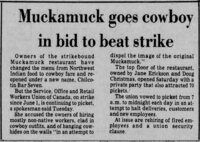 Muckamuck goes cowboy in order to beat strike (Oct 11, 1978) In midst of SORWUC strike action, Muckamuck owners Jane Erikson and Doug Christmas hold a private party at the Muckamuck restaurant "hiring mostly non-native workers, clad in cowboy outfits, and of hanging cowshides on the walls."
Muckamuck goes cowboy in order to beat strike (Oct 11, 1978) In midst of SORWUC strike action, Muckamuck owners Jane Erikson and Doug Christmas hold a private party at the Muckamuck restaurant "hiring mostly non-native workers, clad in cowboy outfits, and of hanging cowshides on the walls." -
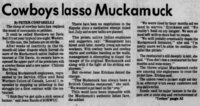 Cowboys Lasso Muckamuck (Oct 11, 1978) 4 1/2 months into the SORWUC strike at the Muckamuck restaurant, the owners open part of the premises with a cowboy theme and the new name "Chilcotin Bar Seven".
Cowboys Lasso Muckamuck (Oct 11, 1978) 4 1/2 months into the SORWUC strike at the Muckamuck restaurant, the owners open part of the premises with a cowboy theme and the new name "Chilcotin Bar Seven". -
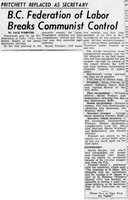 BC Federation of Labour Breaks Communist Control At the annual convention elections, 5 of 9 labor progressive members and their allies on the executive council, lost their positions and the Canadian Congress of Labour (CCL) majority.
BC Federation of Labour Breaks Communist Control At the annual convention elections, 5 of 9 labor progressive members and their allies on the executive council, lost their positions and the Canadian Congress of Labour (CCL) majority. -
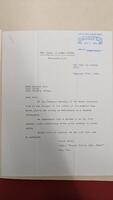 Correspondence between the League of Women Voters and the Vancouver City Clerk_17 Feb 1943 - 17 Mar 1943: White waitresses in Chinatown The League of Women Voters allege white women are working in Chinatown counter to legislation. The City Clerk replies with an interpretation of policies instituted in 1937/1938 which suggests the City may be moving away from their earlier position.
Correspondence between the League of Women Voters and the Vancouver City Clerk_17 Feb 1943 - 17 Mar 1943: White waitresses in Chinatown The League of Women Voters allege white women are working in Chinatown counter to legislation. The City Clerk replies with an interpretation of policies instituted in 1937/1938 which suggests the City may be moving away from their earlier position. -
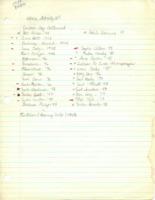 Researcher notes: Hotel and Restaurant Employees Union Local 28 activities Notes by researcher Sara Diamond from her late 1970s-early 1980s Women's Labour History Project. Diamond's notes are written in cursive and assembled in three parts. Does not always follow chronological order. 1930s-1940s
Researcher notes: Hotel and Restaurant Employees Union Local 28 activities Notes by researcher Sara Diamond from her late 1970s-early 1980s Women's Labour History Project. Diamond's notes are written in cursive and assembled in three parts. Does not always follow chronological order. 1930s-1940s
